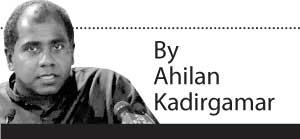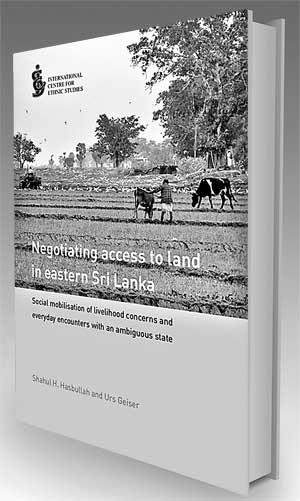Reply To:
Name - Reply Comment
Last Updated : 2024-04-25 00:00:00
Why hasn’t there been a powerful peasant movement in Sri Lanka? Are the rural people governed by an ethnicised Sinhala state? Is political patronage the reason for changes in land use in the countryside? What kind of research is necessary to understand rural people’s economic, social and political challenges? 
These are some of the questions addressed in ‘Negotiating access to land in eastern Sri Lanka: Social mobilisation of livelihood concerns and everyday encounters with an ambiguous state’ by Shahul H. Hasbullah and Urs Geiser, ICES 2019. The book launched at the International Centre for Ethnic Studies on 6 September 2019, where I was a panelist, was also a tribute to retired geography professor from the University of Peradeniya, Shahul Hasbullah, who had passed away a year ago. “Has” as we called him, was a dear friend and an admirable activist researcher, and his untimely passing has left a void in the intellectual space of Sri Lanka.
Hasbullah and his extended family are members of the Northern Muslim community from Mannar, who were evicted by the LTTE in 1990, in an act of ethnic cleansing. His activism was focused and grounded in the return and resettlement of his community from the North. He was also committed to rebuilding inter-ethnic relations during and after the war, and his energies were spent all over the country seeking to understand people’s socio, economic and political challenges. Like his co-author Geiser, he was a geographer committed to field research and extensively recorded spatial and historical changes as they affected people, and their book is characteristic of the kind of critical social research that is very much needed in Sri Lanka. While the writing of the book for the most part had been completed before Hasbullah passed away, Geiser has ensured its publication, and hopefully academics and researchers will discuss and debate many of the issues raised in this insightful work.
Through meticulous research on the struggles around land in the Eastern Province, particularly in the Ampara District and in relation to the Gal Oya development scheme, the work rethinks the problem of the peasantry and their struggles for land. The book engages the political economic literature from four decades back, including the writings of John Harriss, Ronald Herring and Newton Gunasinghe, and it revisits and critiques the important work of Mick Moore, ‘The state and peasant politics in Sri Lanka’ (Cambridge University Press, 1985). They argue that the absence of powerful peasant movements in Sri Lanka compared to the rest of South Asia, are not because of the “relative weakness of social and economic associations and organisations outside the sphere of the state” as analysed by Moore. Rather, with the state providing access to land and ensuring prices for agricultural produce during the early postcolonial decades, the rural constituencies’ demands were much broader and constituted by a variety of interest groups that could not be reduced to the received idea of the “peasant” hungering for land.
"Such peoples’ struggles, which reconstitute local politics and demand changes in local government and administrative boundaries, cannot be reduced to top down “patronage” and “ethnic gerrymandering"
They critique the historical explanation that extends to this day that rural constituencies are merely co-opted through political patronage with state resources. This catch all explanation of “patronage” denies agency to the rural constituencies that struggle and negotiate with the state in numerous ways. The authors point to a variety of interest groups, from cattle farmers seeking grazing land, paddy cultivators confronting the imposition of sugarcane cultivation, farmers seeking irrigation, people confronting the loss of land to flooding by large development  projects, and others who have lost access to their lands gazetted as ‘forest lands’ backed by environmental conservationist lobbies. Such local mobilisations are the political terrain on which multi-ethnic constituencies come together to challenge the state and
projects, and others who have lost access to their lands gazetted as ‘forest lands’ backed by environmental conservationist lobbies. Such local mobilisations are the political terrain on which multi-ethnic constituencies come together to challenge the state and
political authorities.
Such peoples’ struggles, which reconstitute local politics and demand changes in local government and administrative boundaries, cannot be reduced to top down “patronage” and “ethnic gerrymandering”. Rather, the many cases of local communities mobilising to redraw administrative territories are reflective of the political processes demanding greater resources from the state. In fact, many of the smaller units carved out in Ampara District were from same ethnic community, which refutes the ethnicised narrative about the redrawing of administrative units. This is for example the case of the Muslim-dominated Irakkamam DS Division that was carved out from the Muslim-dominated Sammanthurai DS Division in 1999. Similarly in 2011, the Akkaraipattu Municipal Council was carved out of the Akkaraipattu Pradeshiya Sabha, both mainly with Muslim populations, and leaving the latter local government with a much smaller population.
"Hasbullah and Geiser have done the great service of bringing back the broader debate on land central to rural concerns and the workings of the state in our multi-ethnic society"
Such careful research drawing on the authors own engagement on the ground both before and after the war, and drawing extensively on the archive of writings on the East, including that of the reports of the University Teachers for Human Rights (Jaffna) during war-time, provide rich analysis of local mobilisations and the workings of the state. Indeed, the state is not seen as a monolithic institution, rather as a system of institutions consisting of various departments and authorities relating to agriculture, irrigation, local government, local administration etc., which local communities engage with different capacities.
 Political economic research
Political economic researchIn the conclusion to their work, Hasbullah and Geiser critique political discourse and research that relies overwhelmingly on an ethnic lens as well as the problematic dominance of donor-funded research, and in turn call for reviving the political economic research tradition.
“[In Sri Lanka,] the ethnic dimension has become a standard political device (without much empirical grounding) to justify one’s claims, or to disqualify the claims of others.
This political practice has created havoc, but, nevertheless, continues to be used. … [The] dominance of the ethno-political discourse and its consequences is accompanied by a concomitant lack of research that addresses the everyday material challenges ordinary people in Sri Lanka have to face. We mentioned that there was such research in the 1970s and 80s, which focused on political-economic processes and practices. … Of course, there are many economic studies that are being undertaken today, but they are usually emerging from contracts with international donor agencies. We therefore propose that there is a need to re-focus at the least some research in a more political-economic direction, and to specifically research, in a more nuanced manner – and dispassionately – the material livelihood struggles at the grassroots level.”
"The state is not seen as a monolithic institution, rather as a system of institutions consisting of various departments and authorities relating to agriculture, irrigation, local government, local administration etc"
The work ends with the importance of taking local organisations and the need for the state and international donors to consult them to find ways out of land conflicts. Furthermore, they discuss the possibilities inherent in Farmers’ Organisations and co-operatives for emancipatory politics, which not just policy makers but also researchers must consider.
The critique of the state and its workings from the periphery, in the rural corner of the Eastern Province, and starting mainly from the concerns of the Muslim and Tamil communities, is a vantage point I appreciate. I find their deep commitment to critical social research inspiring, and I hope it will influence the younger generation of researchers and activists to follow with a similar vision.
While I agree with their analysis of the dispersed manner in which the state institutions work, it nevertheless raises questions for me about the uses of state power during historical periods of authoritarian consolidation. In Sri Lanka as in many other countries, we are faced with the emergence of authoritarian populist regimes that are mobilising social constituencies with populist discourses, which when they capture state power are able to close to the loop with the nexus of a powerful authoritarian regime, the co-opting of state institutions and the mobilisation of popular social bases. Such a political move undermines the democratic potential of peoples everyday struggles on the ground that have been the preoccupation in the longue durée analysis of Hasbullah and Geiser.
Such questions and debates about the state, democracy and authoritarian regimes in relation to rural constituencies are likely to become all the more important in the months ahead as we face the cycle of decisive elections. The problem here is not so much about the Sinhala state as correctly analysed by the authors, but nevertheless, the political dynamics of nationalist and authoritarian populism can lead to tremendous ethnic polarisation undermining the plural and democratic character of rural Sri Lanka. For historical understanding as well as for our current political moment, Hasbullah and Geiser have done the great service of bringing back the broader debate on land central to rural concerns and the workings of the state in our multi-ethnic society.

Add comment
Comments will be edited (grammar, spelling and slang) and authorized at the discretion of Daily Mirror online. The website also has the right not to publish selected comments.
Reply To:
Name - Reply Comment
US authorities are currently reviewing the manifest of every cargo aboard MV
On March 26, a couple arriving from Thailand was arrested with 88 live animal
According to villagers from Naula-Moragolla out of 105 families 80 can afford
Is the situation in Sri Lanka so grim that locals harbour hope that they coul